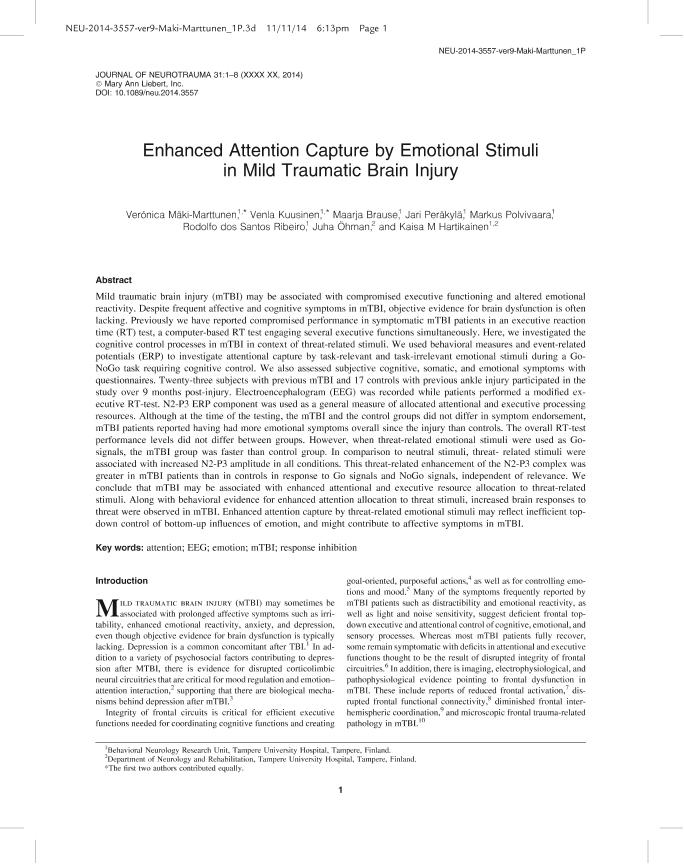Mostrar el registro sencillo del ítem
dc.contributor.author
Exposito, Veronica

dc.contributor.author
Kuusinen, Venla
dc.contributor.author
Brause, Maarja
dc.contributor.author
Peräkylä, Jari
dc.contributor.author
Polvivaara, Markus
dc.contributor.author
Dos Santos Ribeiro, Rodolfo
dc.contributor.author
Öhman, Juha
dc.contributor.author
Hartikainen, Kaisa M.
dc.date.available
2018-03-09T20:25:55Z
dc.date.issued
2015-02
dc.identifier.citation
Exposito, Veronica; Kuusinen, Venla; Brause, Maarja; Peräkylä, Jari; Polvivaara, Markus; et al.; Enhanced attention capture by emotional stimuli in mild traumatic brain injury; Mary Ann Liebert; Journal of Neurotrauma; 32; 4; 2-2015; 272-279
dc.identifier.issn
0897-7151
dc.identifier.uri
http://hdl.handle.net/11336/38479
dc.description.abstract
Mild traumatic brain injury (mTBI) may be associated with compromised executive functioning and altered emotional reactivity. Despite frequent affective and cognitive symptoms in mTBI, objective evidence for brain dysfunction is often lacking. Previously we have reported compromised performance in symptomatic mTBI patients in an executive reaction time (RT) test, a computer-based RT test engaging several executive functions simultaneously. Here, we investigated the cognitive control processes in mTBI in context of threat-related stimuli. We used behavioral measures and event-related potentials (ERP) to investigate attentional capture by task-relevant and task-irrelevant emotional stimuli during a Go-NoGo task requiring cognitive control. We also assessed subjective cognitive, somatic, and emotional symptoms with questionnaires. Twenty-seven subjects with previous mTBI and 17 controls with previous ankle injury participated in the study over 9 months post-injury. Electroencephalogram (EEG) was recorded while patients performed a modified executive RT-test. N2-P3 ERP component was used as a general measure of allocated attentional and executive processing resources. Although at the time of the testing, the mTBI and the control groups did not differ in symptom endorsement, mTBI patients reported having had more emotional symptoms overall since the injury than controls. The overall RT-test performance levels did not differ between groups. However, when threat-related emotional stimuli were used as Go-signals, the mTBI group was faster than the control group. In comparison to neutral stimuli, threat-related stimuli were associated with increased N2-P3 amplitude in all conditions. This threat-related enhancement of the N2-P3 complex was greater in mTBI patients than in controls in response to Go signals and NoGo signals, independent of relevance. We conclude that mTBI may be associated with enhanced attentional and executive resource allocation to threat-related stimuli. Along with behavioral evidence for enhanced attention allocation to threat stimuli, increased brain responses to threat were observed in mTBI. Enhanced attention capture by threat-related emotional stimuli may reflect inefficient top-down control of bottom-up influences of emotion, and might contribute to affective symptoms in mTBI.
dc.format
application/pdf
dc.language.iso
eng
dc.publisher
Mary Ann Liebert

dc.rights
info:eu-repo/semantics/openAccess
dc.rights.uri
https://creativecommons.org/licenses/by-nc-sa/2.5/ar/
dc.subject
Attention
dc.subject
Eeg
dc.subject
Emotion
dc.subject
Mtbi
dc.subject
Response Inhibition
dc.subject.classification
Inmunología

dc.subject.classification
Medicina Básica

dc.subject.classification
CIENCIAS MÉDICAS Y DE LA SALUD

dc.title
Enhanced attention capture by emotional stimuli in mild traumatic brain injury
dc.type
info:eu-repo/semantics/article
dc.type
info:ar-repo/semantics/artículo
dc.type
info:eu-repo/semantics/publishedVersion
dc.date.updated
2018-03-08T19:01:10Z
dc.journal.volume
32
dc.journal.number
4
dc.journal.pagination
272-279
dc.journal.pais
Estados Unidos

dc.journal.ciudad
Nueva York
dc.description.fil
Fil: Exposito, Veronica. Tampere University Hospital; Finlandia. Consejo Nacional de Investigaciones Científicas y Técnicas; Argentina
dc.description.fil
Fil: Kuusinen, Venla. Tampere University Hospital; Finlandia
dc.description.fil
Fil: Brause, Maarja. Tampere University Hospital; Finlandia
dc.description.fil
Fil: Peräkylä, Jari. Tampere University Hospital; Finlandia
dc.description.fil
Fil: Polvivaara, Markus. Tampere University Hospital; Finlandia
dc.description.fil
Fil: Dos Santos Ribeiro, Rodolfo. Tampere University Hospital; Finlandia
dc.description.fil
Fil: Öhman, Juha. Tampere University Hospital; Finlandia
dc.description.fil
Fil: Hartikainen, Kaisa M.. Tampere University Hospital; Finlandia
dc.journal.title
Journal of Neurotrauma

dc.relation.alternativeid
info:eu-repo/semantics/altIdentifier/doi/http://dx.doi.org/10.1089/neu.2014.3557
dc.relation.alternativeid
info:eu-repo/semantics/altIdentifier/url/https://www.liebertpub.com/doi/abs/10.1089/neu.2014.3557
Archivos asociados
